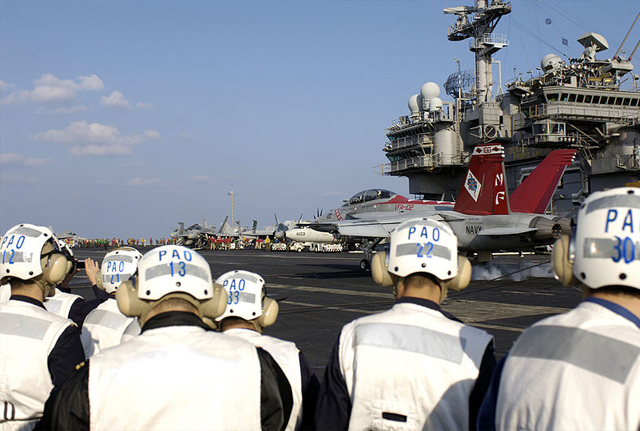From Cornell International Affairs Review VOL. 3 NO. 1For Japan, Better Late than NeverSuch prospects notwithstanding, Hatoyama unswervingly asserts his confidence in the American military presence in Japan; on October 21, 2009 he told US Defense Secretary Robert Gates that “under the circumstances in which uncertainties remain in this Northeast Asia region [referring to North Korea and China], I think it is imperative to maintain and develop our alliance even further.”26 As far as the US is concerned, it seems that Gates will not allow any change of plans: the displeasure of local residents with the noise, pollution, and other disruptions which they attribute to the base that constitute the grounds for Japanese resistance to continued presence in these districts of Okinawa falls far lower on America’s list of priorities than does the proximity of having a base so near mainland China. A second competition of wills between Japan and the US concerning military power has emerged from another clause in the same “Roadmap of Realignment Implementation” signed in 2006. This clause, immediately following the statement of the relocation of the helicopter base in Okinawa, maintains that of the costs generated by the relocation of 8,000 Marines and their 9,000 dependents from Okinawa to Guam by 2014, Japan will foot $6.09 billion of the expense. Tokyo feels that Japan should not be made to shoulder such a heavy price. The movement of troops was arranged with a look towards China’s growing military strength. That Japan and the US share the desire for an American check to China’s power is undeniable. However, though Hatoyama does want troop retrenchments in Japan, it is not unimaginable that he would feel indignant that the Japanese should have to pay the lion’s share for a relocation of troops from their country. This becomes even clearer if one notes that this removal of armed forces would situate troops over 1,500 miles away from mainland Japan. At present the troops are on the islands, ready to be at hand in the second after the alert for the defense of Japan. Hatoyama is not upset that the troops are relocating; he’s simply galled that this clause of the “Roadmap of Realignment Implementation” forces the Japanese to pay for a decrease in their immediate defense. The third point of contention between the US and Japan is also largest and potentially the thorniest. Hatoyama has expressed loudly that he feels the Japanese constitution should be amended, including Article 9, which bars the Japanese from warfighting and relegates its small armed force to its current position of Maritime Self-Defense Force.27 To what degree he would currently like to temper Article 9 is unclear, and to what degree the Japanese Diet (their parliament) would approve is essentially unknown. Though this has caused much understandable anxiety in Washington, one might call its true rationality under question: Hatoyama has not called for the dissolution of Article 9 or the Maritime Self-Defense Force, after all. Furthermore, nowhere does Hatoyama suggest that any newly militarized force would be offensive or that, if Japan were allowed to build its own forces, it would proportionately expel American troops. This may in fact be the right time for Japan to ratchet up its armed forces if ever there will be one: it will certainly send a strong, deterrent message to North Korea if Pyongyang sees both US and Japanese troops manning bases along the archipelago, if not only because of the growth in numbers, also because expanded Japanese forces would guarantee the permanence of the military check from Japan on North Korea. Permission for the Japanese to grow their defensive forces would also finally capitalize on the window of opportunity which the U.S. has forced Japan to waste since the late 1970s,when China’s army first began modernizing and multiplying. If Japan could decrease the relative military power of China by any degree, it would be in America’s interests; though Washington itself prefers to tower above all other military powers, it should sooner encourage Japan to help check China then have itself suffer an additional loss of relative military strength through inaction. It is not unreasonable that the Japanese should want to expand their defensive military forces as regards their own security. Washington does not need to misapprehend this as a threat. More than an attempt on Japan’s part to build any military capability against the US, this indicates a fear the Japanese have concerning the US priorities. As the image of American power and influence begins to dissolve in an international scene of rising multipolarity, Japan is beginning to feel anxious about the difference between the US’ immediate desire for demilitarization in East Asia and Japan’s desire for its own long-term security and the persistence of a Japanese defense capability if, on some distant day, America should no longer be a power-player in Asia. In an op-ed in the New York Times, Yukio Hatoyama himself voiced this conviction of America’s gradual decline, writing that “I [Hatoyama] also feel that as a result of the failure of the Iraq war and the financial crisis, the era of U.S.-led globalism is coming to an end and that we are moving toward an era of multipolarity”28. Japan seems also to be concerned about Washington’s current priorities: with redoubled efforts in Afghanistan and talks of a troop increase, Tokyo wonders where it ranks in the U.S.’s list of military resource allotments. And how quick would the response be to an alert raised in North Korea? Though Washington would undoubtedly reassure Japan on all these measures, it is entirely possible that Japan, in accordance with the international institution of states to grasp after self-help, should be worried. It is also noteworthy in this vein that the DPJ holds unanimously that Japan does not want to develop nuclear weapons. Hatoyama advocates loudly for global non-proliferation. He has rebuked several overtures from North Korea for sanction-lifts and economic cooperation and has confirmed that he will neither normalize relations with Pyongyang nor deviate from the last administrations hard line towards North Korea’s nuclear and missile aspirations29. This repudiation of nuclear weapons – a sentiment deeply rooted in Japan’s history, being the only state to have undergone nuclear attack – has even reached such a pitch that the DPJ members are still debating among themselves about the procedure for the storage, transshipment, and operation of the US’ nuclear weapons in Japan30 31. If any of these policies of the DPJ ought to be unsettling to Obama’s administration, it should be that the new administration feels ambivalent about housing America’s nuclear arms. Currently, Japan’s military forces serve strictly in a defensive role, working with the United States to protect its territory. Two more positions the DPJ has held – but has also abandoned – are worth noting, if only for understanding the party’s lineage. It has since abandoned both. First, this is not the first time the DPJ has questioned the LDP’s approach to Article 9. Throughout its political career the DPJ’s leaders, especially Ichiro Ozawa, strongly criticized the use of the Japanese Maritime Self-Defense Force in UNauthorized operations. Ozawa declared this a direct violation of the nation’s everlasting relinquishment of war as stated in the article The rest of the DPJ, though not so outspoken as Ozawa on the controversial issue above, have taken issue with the use of the Maritime Self-Defense Forces in antipiracy operations in the Gulf of Aden and the Indian Ocean surrounding Somalia.32 In the 2009 election manifesto of the DPJ, however, it reads that the DPJ will “play a proactive role in UN peacekeeping operations”33. The second renounced point was the Japanese participation in refueling missions for the US-led forces in Afghanistan. These operations used the Maritime Self-Defense Force as a fleet of fuel-taxis that refilled the coalition in the Indian Ocean. It is essential to the efficiency of the war effort that the Japanese continue this cooperation, though it did cause some concern amongst DPJ members as to the legitimacy of these actions as wise foreign involvements and under Article 9. Though it has opposed such missions, it has accepted them for now. More might be said on this issue, however, in January, when the law allowing this assistance is set to expire34. Though the DPJ has stated these areas of reform, as a nascent administration only recently assuming power they have not intimated what degree of reform they hope to undertake. Furthermore, it can be confirmed that they will make no dramatic change without including the US and, in all likelihood, without proposing it first to Obama’s administration before Tokyo’s own Diet. Hatoyama has never softened in his dedication to “building constructive, futureoriented relations with the Japan-US alliance as the cornerstone”35, nor does Washington have any reason to expect such wavering. In light of these concerns of the DPJ, it should be mentioned that, if Japan is going to reassert itself as a leading power in Asia, it needs to do so under this administration and in tight step with the US. Any breakdown in communication or cooperation between the two states would be detrimental to both, though obviously more so to Japan. Accordingly and in absolute terms, Japan should sooner accept American terms than sever itself from the U.S. alliance, though there are very few issues in which the US should be entirely inflexible. Japan will not have much more time to act and reassert itself as a leading power in Asia. China has long surpassed it as the military power of the East, as per America’s interference. (Whether this interference was in America’s long-term interest is not nearly as important as addressing how America will continue to promote stability in Asia through its influence with Japan and other nations.) China will soon outstrip Japan as the world’s second largest economy36. The emergence of China has detracted from Japan in these two spheres that historically Japan has dominated. It is in both the US’ and Japan’s shared interest that Japan rise to its previous position of regional leader and stabilizer. Japan needs to remind America that, as far as Washington is concerned, better Tokyo than Beijing in all foreign policy matters. This preference should be seen as a path-dependent result of Japan’s history as the US’s prominent eastern Cold War ally and of the transparency that has prevailed in all rapport between Japan and the US since the Allied occupation after WWII. Japan needs to stabilize its economic growth and raise itself up as an Asian economic leader by balancing its account surplus, strengthening the yen, and investing in neighboring markets. Japan needs to reassure the US that its policy of “enter Asia, enter the West” reaffirms and secures America’s influence in Asia. It should be a selfreinforcing alliance that is forged between the Tokyo and Washington: Washington should promote Japanese regional influence and grant it limited military independence, and Tokyo, through its privileged status as America’s liaison in Asia, should uphold America’s interests for stability, security, and the continued presence and role of the US in Asian military and economic decisions37. AuthorsWilliam Gerding, Cornell University, 2013 Zach Montague, Cornell University, 2013 Endnotes
Photos Courtesy of:
Suggested Reading from Inquiries Journal
Inquiries Journal provides undergraduate and graduate students around the world a platform for the wide dissemination of academic work over a range of core disciplines. Representing the work of students from hundreds of institutions around the globe, Inquiries Journal's large database of academic articles is completely free. Learn more | Blog | Submit Latest in Political Science |


















